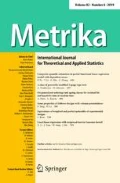Abstract
Based on the Cramér-Rao inequality (in the multiparameter case) the lower bound of Fisher information matrix is achieved if and only if the underlying distribution is ther-parameter exponential family. This family and the lower bound of Fisher information matrix are characterized when some constraints in the form of expected values of some statistics are available. If we combine the previous results we can find the class of parametric functions and the corresponding UMVU estimators via Cramér-Rao inequality.
Similar content being viewed by others
References
Bartlett MS (1982) The “ideal” estimation equation. In: Essays in Statistical Science (papers in honour of Moran PA). J Appl Probab Special 19A:187–200
Bartlett MS (1983) Examples of minimum variance estimation. Aust J Stat 25:174–181
Bellman R (1970) Introduction to matrix analysis. McGraw-Hill, New York
Brown LD (1986) Fundamentals of statistical exponential families with applications in statistical decision theory. Institute of mathematical statistics. Lecture notes-Monograph series 9
Campbell LL (1970) Equivalence of Gauss's principle and minimum discrimination information estimation of probabilities. Ann Math Stat 41:1011–1015
Drygas H (1987) On the multivariate Cramér-Rao inequality. Stat Hefte 28:69–71
Fabian V, Hannan J (1977) On the Cramér-Rao inequality. Ann Stat 5:197–205
Ferentinos K, Papaioannou T (1981) New parametric measures of information. Information and control 51:193–208
Ferentinos K (1984) Note on the use of the Cramér-Rao inequality for finding uniformly minimum variance unbiased estimators. Metron 42:127–131
Frieden BR (1988) Applications of optics and wave mechanics of the criterion of maximum Cramér-Rao bound. J Mod Opt 35:1297–1316
Holevo AS (1982) Probabilistic and statistical aspects of quantum theory. North-Holland
Huber PJ (1981) Robust statistics. John Wiley, New York
Jarrett RG (1984) Bounds and expansions for Fisher information when the moments are known. Biometrika 71:101–113
Jaynes ET (1957) Information theory and statistical mechanics. Physical Review 106:620–630
Jonson RA, Ladala J, Liu ST (1979) Differential relations in the original parameters which determine first two moments of the multiparameter exponential family. Ann Stat 7:232–235
Joshi VM (1976) On the attainment of the Cramér-Rao lower bound. Ann Stat 4:998–1002
Kagan AM (1985) Information property of exponential families. Theory Probab. Appl 30:831–835
Kagan AM (1989) A multivariate analog of the Cramér theorem on components of the Gaussian distribution. In: Stability problems for stochastic models, Lecture notes in mathematics 1412:68–77
Kagan AM, Linnik Yu V, Rao CR (1973) Characterization problems of mathematical statistics. John Wiley, New York
Kapur JN (1989) Maximum entropy models in science and engineering. Wiley eastern limited
Koshevnik Yu A, Levit B Ya (1976) On a non parametric analogue of the information matrix. Theory Probab Appl 21: 738–753
Kullback S (1959) Information theory and statistics. John Wiley, New York
Kullback S (1985) Fisher information. In: Encyclopedia of statistical sciences, Kotz S, Johnson NL (Eds) 3:115–118
Lehmann E (1983) Theory of point estimation. John Wiley, New York
Levit B Ya (1975) On the efficiency of a class of non parametric estimates. Theory Probab Appl 20:723–740
Li G, Cheng P (1983) Some results on Cramér-Rao type bounds. Kexue Tongbao (English Ed.) 28:5–9
Mardia KV, Kent JT, Bibby JM (1979) Multivariate analysis. Academic Press
Mead LR, Papanicolaou N (1984) Maximum entropy in the problem of moments. J Math Phys 25:2404–2417
Papathanasiou V (1990) Characterizations of the multidimensional exponential families by Cacoullos type inequalities. J Multivariate Anal 35:102–107
Shore JE, Johnson RW (1980) Axiomatic derivation of the principle of maximum entropy and the principle of minimum cross entropy. IEEE Trans. Inf Theory IT-26:26–37
Wijsman RA (1973) On the attainment of the Cramér-Rao lower bound. Ann Stat 1:538–542
Zacks S (1971) The theory of statistical inference. John Wiley, New York
Author information
Authors and Affiliations
Rights and permissions
About this article
Cite this article
Zografos, K., Ferentinos, K. An information theoretic argument for the validity of the exponential model. Metrika 41, 109–119 (1994). https://doi.org/10.1007/BF01895310
Received:
Revised:
Issue Date:
DOI: https://doi.org/10.1007/BF01895310




